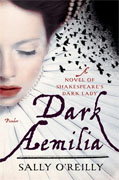Dark Aemilia
Sally O'Reilly
book reviews:
· general fiction
· chick lit/romance
· sci-fi/fantasy
· graphic novels
· nonfiction
· audio books
· author interviews
· children's books @
curledupkids.com
· DVD reviews @
curledupdvd.com
newsletter
win books
buy online
links
home
for authors
& publishers
for reviewers

 |
Dark Aemilia: A Novel of Shakespeare's Dark Lady Sally O'Reilly Picador Hardcover 448 pages May 2014 |
|
Aemilia Bassano, the comely mistress of the Queen’s cousin, Lord Henry Cary Hunsdon, is hot and bothered, her lover is cool and collected, and the dashing young playwright who takes a shine to her is desired by both Aemilia and by an aging Queen. Amid the sex, romance, lust and infidelity—and the bedroom antics of both Aemilia and William Shakespeare—things will end badly as this period piece of class divides, sexual politics, and power games reaches its shocking climax.
As William and Aemilia’s tale of thwarted, misbegotten love unfolds, O‘Reilly proves well-equipped to handle their intensity and intimacy. Aemilia looks down on the sprawl of Whitehall with its checkerboard of courts and gardens. Fate dictates she will be married, but not to the one she loves: “a love that will be the better part of you.” Destined to be only William’s lover, restless and distracted Aemilia reads his delirious missives in a state of trembling disbelief, unable or unwilling to lower herself to his station. Such ardor and passion soon transforms Aemilia. “Like being reborn in Eden,“ the young playwright introduces his muse to the pleasures of the bed, and she falls under his sensual spell. For much of the novel, Aemilia is fueled by rage. That she is just a woman in a world that has no regard for a her station or for her sex is a notion that is readily shared. When Aemilia‘s “curse-blood is late,” we feel her mounting fear as she prays for deliverance. Will calls her a “penniless bastard whore,” a temptress, and a witch, and Aemilia soon finds herself lambasted by both Hunsdon and her lover. She is exiled to an uncertain future in Smithfield with her young son, Henry, with no money and the business of being married to a flimsy and reckless musician. In Dark Aemelia Although this material feels a little familiar by now, O’Reilly can evoke a state of mind with such intensity that the reader lives and breathes Elizabethan London. Soon the exchanges between Will and Aemilia signify that their love has become secondary. Perhaps competition is the end game between them, where animosity and envy are the central weapons. By the guttering half-light, Aemilia writes a “candle tale” drawn on fear and the horror of the plague, as well as something of the “Lilith’s diabolic craft.” The Lilith plague-play, The Tragedie of Ladie Macbeth, allows Aemilia to find herself betrayed by something dark and sinister in a world that always seems controlled by religious fundamentalism. Despite finding the supernatural turns of the plot underwhelming, I read the book almost continuously to the moment I turned the final page, marveling at O’Reilly’s attention to period detail and how her heroine was so easily hijacked by passion. Certainly Aemilia was tragic, especially when told through history’s standpoint. Also, William’s sonnets are essential to the narrative, a sign for his forgiveness which is rather ironic, considering that for much of her life Aemilia lived in a world so blackened and obscene. Originally published on Curled Up With A Good Book at www.curledup.com. © Michael Leonard, 2014 |
|
|
|
 Click here to learn more about this month's sponsor! |
|
| fiction · sf/f · comic books · nonfiction · audio newsletter · free book contest · buy books online review index · links · · authors & publishers reviewers |
|
| site by ELBO Computing Resources, Inc. | |
 O’Reilly’s novel begins with a potent triumvirate of personalities: Aemilia, a musician’s orphan bought up in court who loves to read and yearns to write poetry; Hunsdon, who woos his mistress with kind words, small gifts, and books “from the Low Countries”; and William, whom Aemilia finds at first churlish even when his only wish is to entertain her. The novel opens in 1592 as William debuts his great bawdy play The Taming of Shrew, the character of Katherine becoming a mirror image of Aemilia, who is at first an unwilling participant in the relationship but is soon seduced by William’s passionate missives and his various romantic torments.
O’Reilly’s novel begins with a potent triumvirate of personalities: Aemilia, a musician’s orphan bought up in court who loves to read and yearns to write poetry; Hunsdon, who woos his mistress with kind words, small gifts, and books “from the Low Countries”; and William, whom Aemilia finds at first churlish even when his only wish is to entertain her. The novel opens in 1592 as William debuts his great bawdy play The Taming of Shrew, the character of Katherine becoming a mirror image of Aemilia, who is at first an unwilling participant in the relationship but is soon seduced by William’s passionate missives and his various romantic torments.